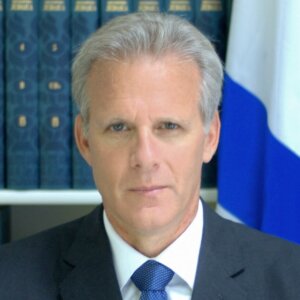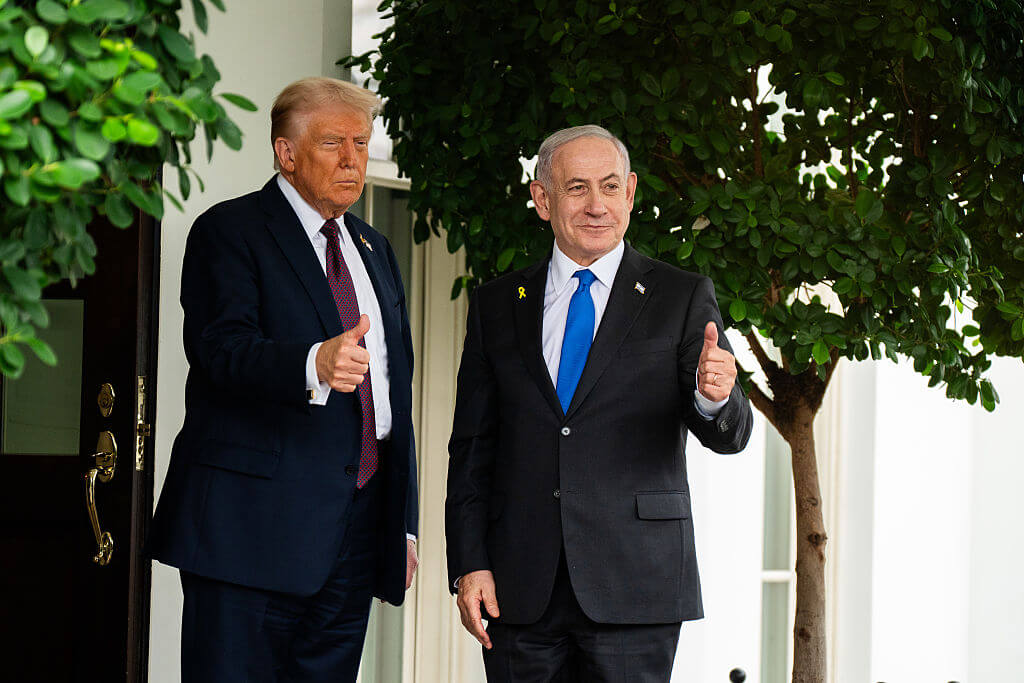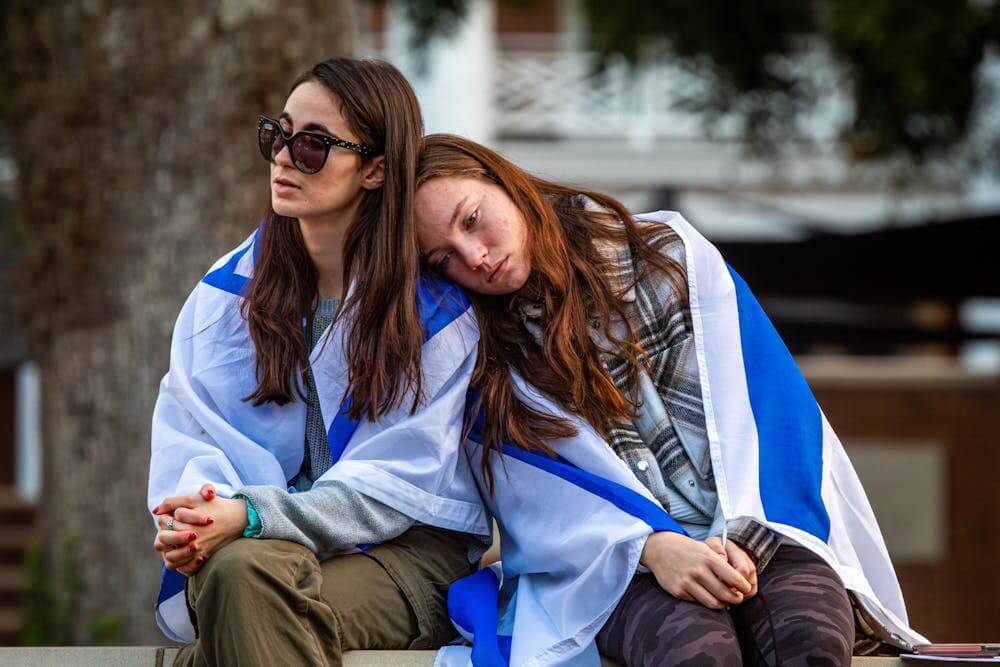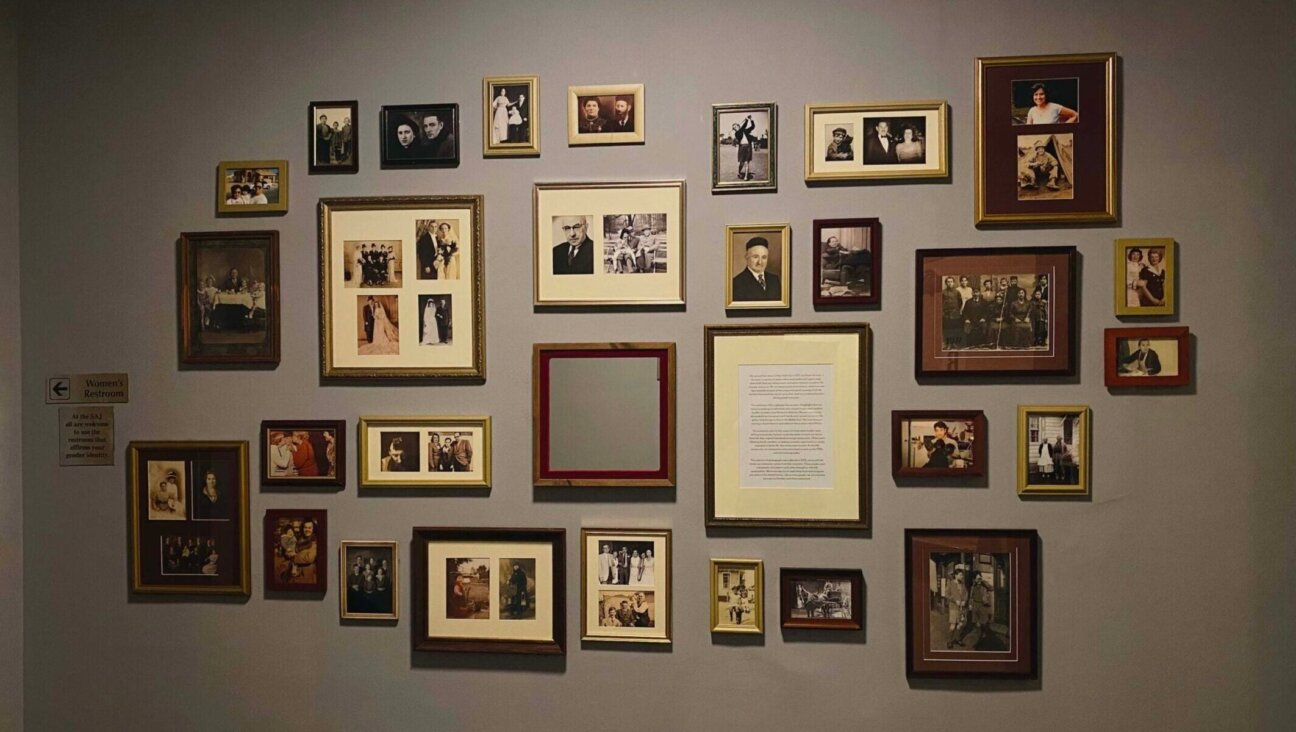This week left Israelis dazed and confused. What we do next will have existential consequences
Beyond the conflicts over checks and balances, minority rights and the dangers of dictatorship lies a clash between different, possibly irreconcilable, Israels
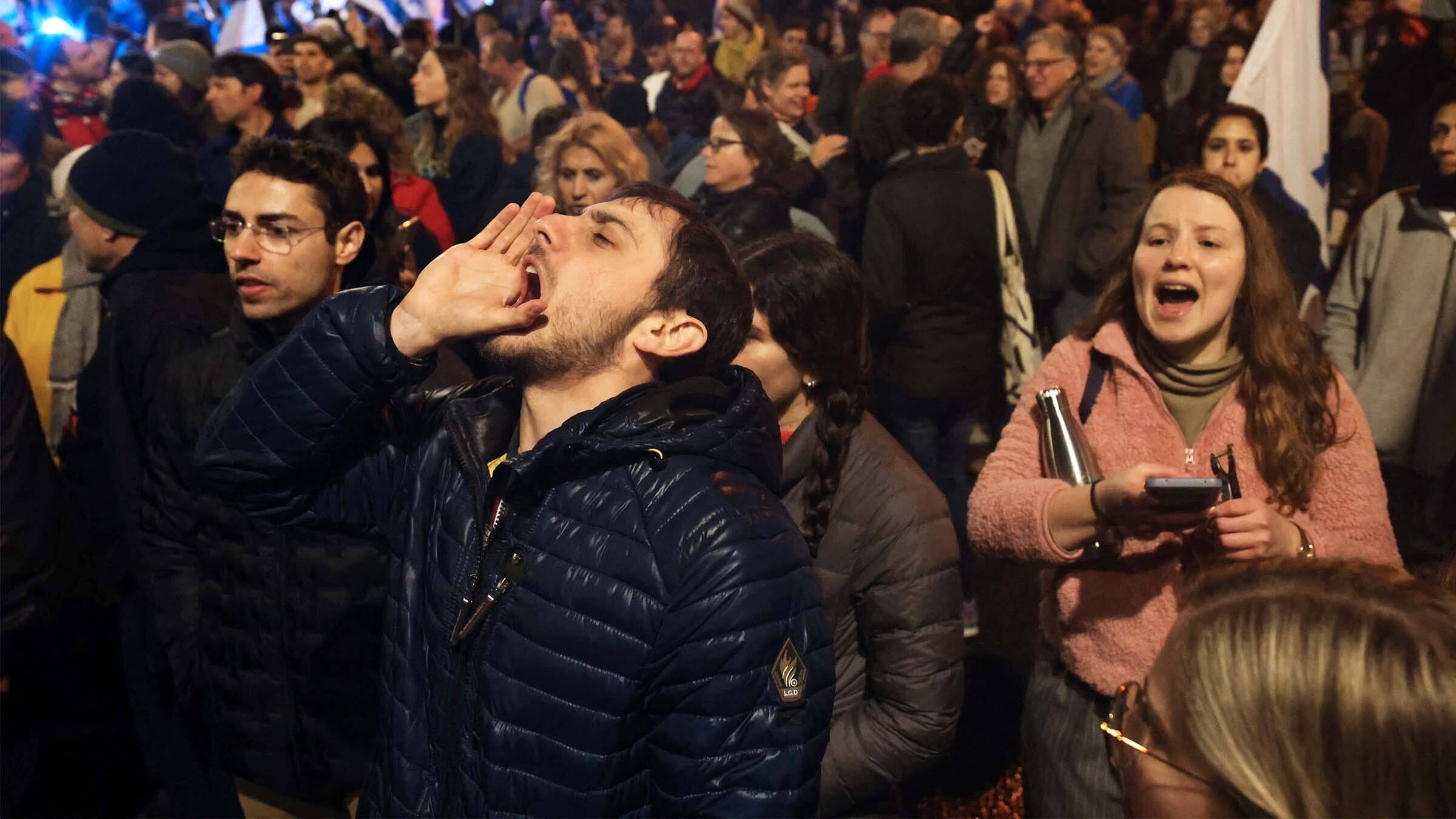
Demonstrators wave flags during a rally against the Israeli government’s judicial reforms outside Prime Minister Benjamin Netanyahu’s residence in Jerusalem, on March 27, 2023 Photo by AHMAD GHARABLI/AFP via Getty Images
Like victims of an assault from behind, Israelis are waking up today with a massive headache and wondering what hit them. They’re asking themselves who they really are.
In the three months since the inauguration of the latest Netanyahu government — the most right-wing in Israel’s history — the county has reeled through consecutive, multifaceted, and rapidly escalating crises.
Much fog surrounds these upheavals, but one fact is painfully discernible. Beyond the conflicts over checks and balances, minority rights, and the dangers of dictatorship, there lies a clash between different, possibly irreconcilable, Israels. We desperately need right now an effort not only to find a compromise between the government and the Opposition, but to forge new bonds between these two worlds.
Right-wing radicals
First came the appointment of Itamar Ben-Gvir, a disciple of the racist Rabbi Meir Kahane and mass murderer Baruch Goldstein, to the Internal Security Ministry, and of the unabashed bigot Bezalel Smotrich to a Defense Ministry position in charge of West Bank settlements.
Both men were committed to placing Israel on a collision course with the Palestinians as well as with the international community, poisoning our relationship with Washington and potentially unravelling the Arab Accords. A great number of Israelis were appalled.
Next came the coalition’s efforts to name Aryeh Deri, twice convicted of bribery and fraud, as Interior Minister and Vice Prime Minister. When 10 out of 11 Supreme Court judges ruled the nomination “unreasonable in the extreme,” the government moved to change Israel’s basic laws — collectively representing the country’s equivalent to a constitution — to enable it. The same Israelis appalled by the Smotrich and Ben Gvir appointments were outraged by Deri’s.
But their outrage only deepened. Bills proposed by the ultra-Orthodox parties aimed to criminalize immodest dress at the Western Wall, prohibit the use of electricity on Shabbat, and forbid the bringing of “chametz” — leavened food — into hospitals on Passover. Other laws aimed to finance improvements in Prime Minister Benjamin Netanyahu’s private residence in Caesarea and allow him to receive “gifts” to pay for his defense against three separate charges of corruption.
Judicial reform, or revolution?
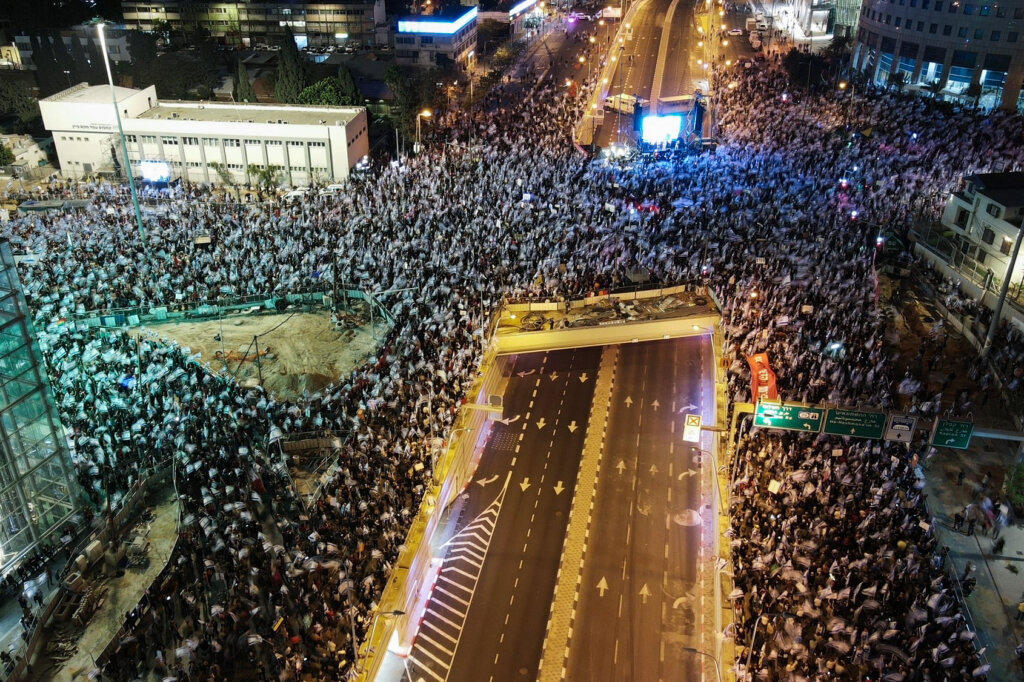
All of these controversies were combustible enough without the firestorm ignited around the coalition’s push for judicial reform. Rushed through Knesset committee at lightning speed and on the basis of a slim popular majority, the coalition sought to alter the country’s democratic DNA. Stripped would be the Supreme Court’s ability to overturn Knesset legislation, eliminating judicial review, a centerpiece of virtually all democratic systems, and effectively removing the already-limited checks on Israeli government.
Suddenly, the prospect of Shabbatot without electricity and prison time for tank top wearers at the Kotel did not seem fantastical. Nor was the outlawing of homosexuality and the equation of military service with yeshiva studies. Israeli society was in danger of undergoing a radical and, in the eyes of liberal Israelis, dictatorial change.
Democracy takes the streets
Protests against Netanyahu and his policies had been raging for years. But now, suddenly, they surged. Hundreds of thousands of Israelis took to the streets in demonstrations that grew and spread throughout the country. Though some protesters emphasized LGBTQ+ and women’s rights, or an end to the occupation, all were united in opposing the government’s proposed reforms — as they called it, “the overhaul.” Most supported President Isaac Herzog’s efforts to mediate a compromise.
But Netanyahu rejected that offer. He fired his defense minister, Yoav Gallant, for advocating it. This move brought even more Israelis to the streets. Thousands of IDF reservists, many of them commandos and pilots, refused to report for duty. High-tech entrepreneurs transferred their business out of the country and prepared to emigrate. The Histadrut labor federation declared a nationwide strike; Ben-Gurion Airport closed. The country was paralyzed, presenting Netanyahu with little choice but to freeze the legislative process until at least after the Passover and Independence Day holidays, and to accept Herzog’s offer of mediation.
The eye of the storm
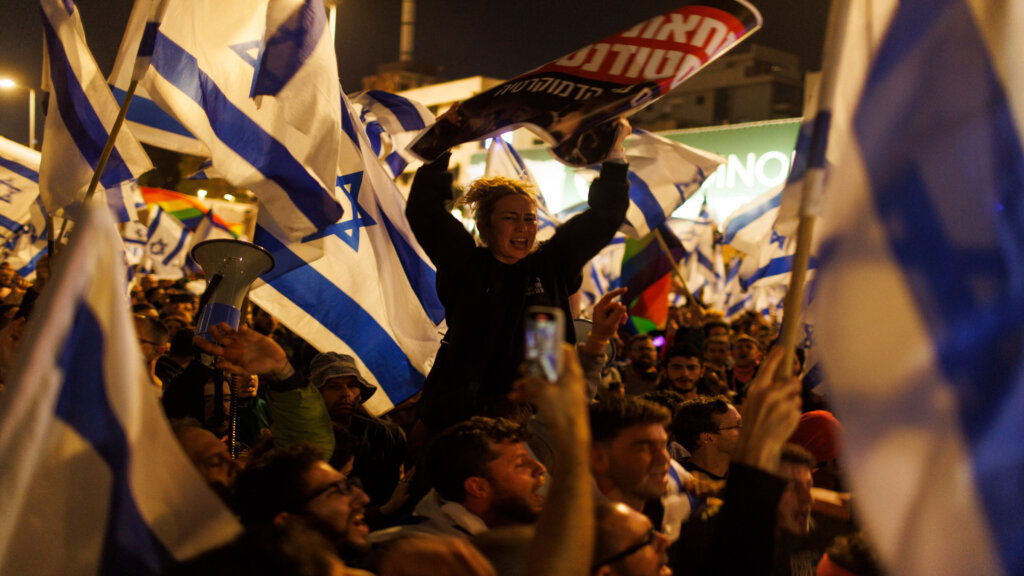
The protestors had won — or at least they appeared to, for the time being. Virtually none of them trusted Netanyahu to negotiate in earnest or give up his efforts to alter the legal system in a way that would immunize him from jail time.
There were still the millions of shekels the government had allocated for ultra-Orthodox schools, funding their refusal to serve in the army and to provide their students with anything beyond a second-grade modern education. There was still Smotrich and Ben-Gvir, the latter of whom, in return for suspending the legislation, received permission to create his own billion-shekel, 1,800-man “national guard” to fight crime, presumably in the Arab sector. Tensions in Israel’s relations with the United States, spotlighted by President Biden’s open criticism of the overhaul and his refusal to invite Netanyahu to the White House, seemed certain to escalate.
The protestors had won a temporary victory. But among the millions of Israelis who remained at home were large numbers who felt defeated. These were the Israelis who believed in the existence of a left-wing, mostly Ashkenazi, elite which never reconciled itself to its loss at the polls and who viewed the Supreme Court as the final redoubt of its power. These were the Israelis who saw the cases against Netanyahu, brutally pursued by politically motivated prosecutors at vast national expense, as trussed-up efforts at a coup.
While having no illusions about Ben- Gvir and Smotrich’s racism, some view it as corrective to the Islamist Arab party included in the previous government. These were the Israelis who lamented their government’s capitulation to a mob, the Histadrut’s engaging in a first-time-ever political (as opposed to financial) strike, and the airport’s shutdown by fellow Israelis rather than by terrorist rocket fire. They see an American president who, having witnessed an attempted takeover of his Capitol, has no right to preach democracy to anyone, least of all of Israel, which has never experienced a putsch.
If the demonstrators see themselves as defending democracy, this other Israel feels betrayed by the politicians they elected. Right-wing reservists never once failed to show up for duty, not even after the excruciating disengagement from Gaza, they recall, and right-wing entrepreneurs never threatened to leave the country. They, and not the elitists in the streets, they claim, are the true Zionists.
What comes next
On one hand, there’s Israel that seeks to resemble a normal Western country, is at peace with its neighbors, and accepted by the world, a largely secular nation of creativity, openness, and equality.
On the other hand is an Israel which does not want to be normal but Jewish, which sees itself engaged in a life-and-death struggle with the Arabs, and which gives precedence to faith and security over international approval and high-tech. It’s a kulturkampf that has already left Israel fractured, perhaps irrevocably.
Who’s to say that, whether from the left or the right, army reservists who oppose a certain policy will once again refuse to serve, or that the airport won’t once again be shuttered? What guarantee do Israelis now have that a future government with an opposing ideology won’t try to overturn long-accepted norms and remake Israel legislatively in its own image?
The situation remains disorienting — no wonder American Jewish organizations are flailing to respond to it, precisely at a time when emergencies such as Iran’s rush to nuclearization requires the utmost clarity.
Efforts must be mounted to make the ultra-Orthodox a part of modern Israel, to enforce Israeli laws in the Arab sector, and to provide a diplomatic horizon for the Palestinians.
We must remind ourselves that Israel is the nation-state of all the Jewish people, irrespective of our political orientation, ethnic background, or manner of religious observance. We must not only grapple with current crises but envision a common secure and propitious future. Only then can the fracturing of the past three months become an opportunity for renewed Israeli unity and commitment to our dual character as the Jewish and democratic state.
To contact the author, email [email protected]
